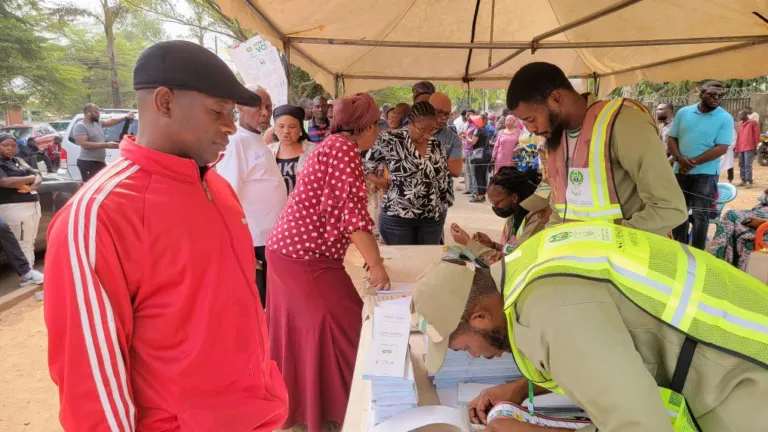Constitutional disempowerment of state electoral commissions and its impact on local government elections in Nigeria

The key factors contributing to these flawed elections include the absence of constitutionally guaranteed financial and operational independence for State Electoral Commissions (SIECs). This lack of autonomy enables state governors to interfere in SIEC operations and deprive them of necessary funds, thus undermining their ability to conduct credible elections. These constitutional weaknesses incapacitate the SIECs, depriving citizens of their right to elect leaders who represent their will.
The catalytic effect of the Supreme Court ruling strengthening the financial autonomy of local governments is evident in the current rush by state governments to conduct local government elections. Since the ruling, over 15 states have announced local government area (LGA) election dates. The Court's unequivocal declaration that "a democratically elected local government is sacrosanct and non-negotiable" has rendered caretaker committees appointed by governors illegal. Before this ruling, 462 local governments in 22 states were administered by caretaker committees. Following the verdict, these local governments will not receive funds from the Federation Account until elected officials are in place.
Calls to liberate State Independent Electoral Commission (SIECs) from the stranglehold of state governors have also intensified. Three proposals have emerged for ensuring credible elections at the local government level. First, state electoral commissions should be reformed to strengthen their independence from governors. Second, abolishing SIECs and transferring the responsibility of conducting local government elections to the Independent National Electoral Commission (INEC), and lastly, establishing a new national body to conduct local government elections. Nigeria's upper legislative house recently took action to advance the third proposal. The Senate passed for first reading a bill sponsored by Senator Sani Musa (APC, Niger East) to create the National Independent Local Government Electoral Commission (NILGEC) as a federal agency to organize, oversee, and conduct elections for the offices of local government chairman and councilors in all 36 states and the FCT.
State electoral commissions in Nigeria’s 1999 constitution
Under Nigeria's Constitution, State Independent Electoral Commissions (SIECs) are established in Section 197 (1b) as State Executive bodies alongside the State Civil Service Commission and State Judicial Service Commission. As specified in Section 3, Part II of the Third Schedule to the Constitution, the SIECs shall comprise a Chairman and not less than five (5) but not more than seven (7) other persons. Section 4 empowers the SIECs with the power to organize, undertake, and supervise all elections to the local councils. SIECs also advise the INEC on the compilation of the voter register. The Chair and commissioners of the SIECs are appointed by the Governor of the State subject to confirmation by a resolution of the House of Assembly (Section 198). Members of the commission serve a tenure of five years, renewable once (Section 199 (1c). SIEC members shall only be removed from office by a Governor acting on an address supported by a two-thirds majority of a state House of Assembly praying that a member is removed for inability to discharge the functions due to infirmity of mind, body or any other cause and for misconduct (201(1)). The Constitution also states that the power of SIECs to make appointments or to exercise disciplinary control over persons shall not be subject to the direction and control of any other authority or person (Section 202).
Constitutional disempowerment of state electoral commissions
While the Constitution places a premium on democratically elected local government under Section 7 of the Constitution of the Federal Republic of Nigeria, 1999 as amended, it fails to provide safeguards for institutional autonomy for the institution tasked with giving life to its aspiration of democratically elected local government councils. The following constitutional pitfalls significantly undermine the ability of SIECs to conduct credible local government elections:
1. Operational control of SIECs by governors: Section 204(1) subjects the power of SIECs to regulate its procedure and confer powers and duties on any officer or authority to the approval of the Governor. By this provision, the Constitution fails to insulate the SIECs from executive control. This constitutional mishap emboldens state executives to manipulate SIECs and influence electoral outcomes. Electoral commissions are required to be independent so they can enforce guidelines and rules of procedure without bias. Unfortunately, state electoral commissions can’t operate independently because the Constitution does not guarantee administrative independence. In contrast, Section 160(1) of the Constitution protects the independence of the Independent National Electoral Commission (INEC) by stating that INEC’s powers to make its own rules and guidelines shall not be subject to the approval or control of the President.
2. Lack of financial autonomy: Electoral commissions thrive where access to election funding is guaranteed. Financial autonomy facilitates planning and insulates the commission from undue interference from external actors. SIECs are financially dependent on state governors, as Section 121(3) excludes them from institutions funded directly by the Consolidated Revenue Fund of the state. The lack of financial autonomy makes SIECs susceptible to control and manipulation. SIECs face significant uncertainties regarding their funding as they rely heavily on the discretion or benevolence of the Governor to release funds for election management even in cases where the state legislature has appropriated the commission's budget. Typically, SIECs receive funding only to conduct local government elections, and in the period between elections, they lack resources for necessary pre- and post-election activities. In instances where funds are allocated, they are often released merely 90 days before the elections, making it challenging to deliver credible elections. In contrast, INEC's financial autonomy is secured through Section 81(3), which places it on the first-line charge of the Federation's Consolidated Revenue Fund. The 2022 Electoral Act mandates the release of election funding one year before elections.
3. No constitutional timeframe for local government elections: The Constitution is silent on the tenure of local government councils and the timeframe for conducting elections. This loophole is exploited to dictate the tenure of local government chairmen and councillors, including justifying the arbitrary dissolution of local government councils. SIECs often release election timetables based on the Governor's body language. A defined constitutional timeframe for local government elections is necessary to ensure consistency and fairness.
4. Insufficient qualification criteria for SIEC members: The only constitutional requirement for appointment into SIEC is non-membership of a political party. While this is a necessary condition, it is grossly inadequate. Other conditions essential for election administration, such as unquestionable integrity and competence, are excluded in Section 200 of the Constitution. INEC appointments require non-partisanship and unquestionable integrity, a standard that should also apply to SIECs.
How to strengthen state electoral commissions to deliver credible elections
---1. Introduce tenure for local government councils: The tenure of local government councils should be prescribed in the Constitution. This will guarantee the conduct of regular elections and put an end to the loophole exploited to justify the appointment of caretaker committees or dissolution of local government councils.
---2. Safeguard the operational autonomy of SIECs: The Constitution makes explicit provisions that state that the power of SIECs to regulate their own procedure and confer powers and duties on any officer or authority shall not be subject to the approval of the Governor or any person. This will strengthen SIECs' independence and liberate them from the stranglehold of governors.
3. Strengthen the financial autonomy of SIECs: To guarantee the financial autonomy of the SIECs, its funding should be on first-line charge. In other words, the financing of the SIECs should be charged to the state's Consolidated Revenue. By incorporating this provision, the financial independence of SIECs will be safeguarded, ensuring that their functions are free from undue political influence. Alternatively, local government may, through legislation, contribute 5% of their allocation to SIECs and local government elections in view of the direct allocation from the Federation Account.
4. Review the mode of appointments into SIEC: The power to appoint the Chairman and members of SIECs should be divested from the Governors. The Constitution should introduce the procedure outlined below;
---1. Nomination: Where a vacancy arises in the SIEC, the state assembly should set up an independent committee to handle nominations. The committee issues a widely publicized call for nominations.
---2. Interview panel: Shortlisted candidates undergo an interview to assess competence, character, and suitability for appointment to the SIEC
---3. Confirmation by the State Assembly: The state assembly shall consider the interview panel report and public petitions. A two-thirds majority resolution by the state assembly is required to recommend a candidate to the Governor for appointment.
5. Introduce timelines for appointment in SIECs: The Constitution should be amended to introduce specific timelines for appointing members to State Independent Electoral Commissions (SIECs). Appointments must be made within 30 days of a vacancy. This will prevent unwarranted delays in constituting the commission's board, ensuring that SIECs can function effectively and without interruption.
6. Strengthen the criteria for membership of SIEC: In addition to non-membership of political parties, the Constitution should be amended to introduce age, integrity, and competence as criteria for appointment into SIECs. Members of the SIEC should not be less than 25 years of age.
7. Redefine the power and functions of SIECs: The powers of the SIECs should be reviewed to strengthen their independence and effectiveness. Its powers should be expanded to include; monitoring party primaries, congresses, and conventions related to local government elections, promoting knowledge of sound democratic election processes at the local government level, conducting any referendum required to be conducted under the provisions of the Constitution of the Federal Republic of Nigeria and any Law of the State House of Assembly.
With the Supreme Court judgment, local government elections will be a cynosure for political actors and election stakeholders, significantly raising the stakes. As the stakes increase, so does the pressure to deliver credible elections. This could usher a new vista for local elections, which have previously been overlooked. The vision of a democratically elected local government can only be realized if the State Independent Electoral Commissions (SIECs) are reformed, repositioned, and strengthened to safeguard electoral democracy at the local level. By undergoing reforms similar to those implemented by the Independent National Electoral Commission (INEC), SIECs can significantly enhance the quality of local government elections. Proposals to create a new federal election body to conduct local government elections or to vest the Independent National Electoral Commission (INEC) with this power are knee-jerk solutions. Such proposals risk centralizing power, which could undermine the principles of federalism. To deepen electoral democracy in Nigeria, focusing on strengthening SIECs with constitutional safeguards for conducting credible and inclusive elections at the local level is more advantageous.
Disclaimer: Opinions expressed in this commentary are those of the authors and do not necessarily represent the institutional position of International IDEA, its Board of Advisers or its Council of Member States.




